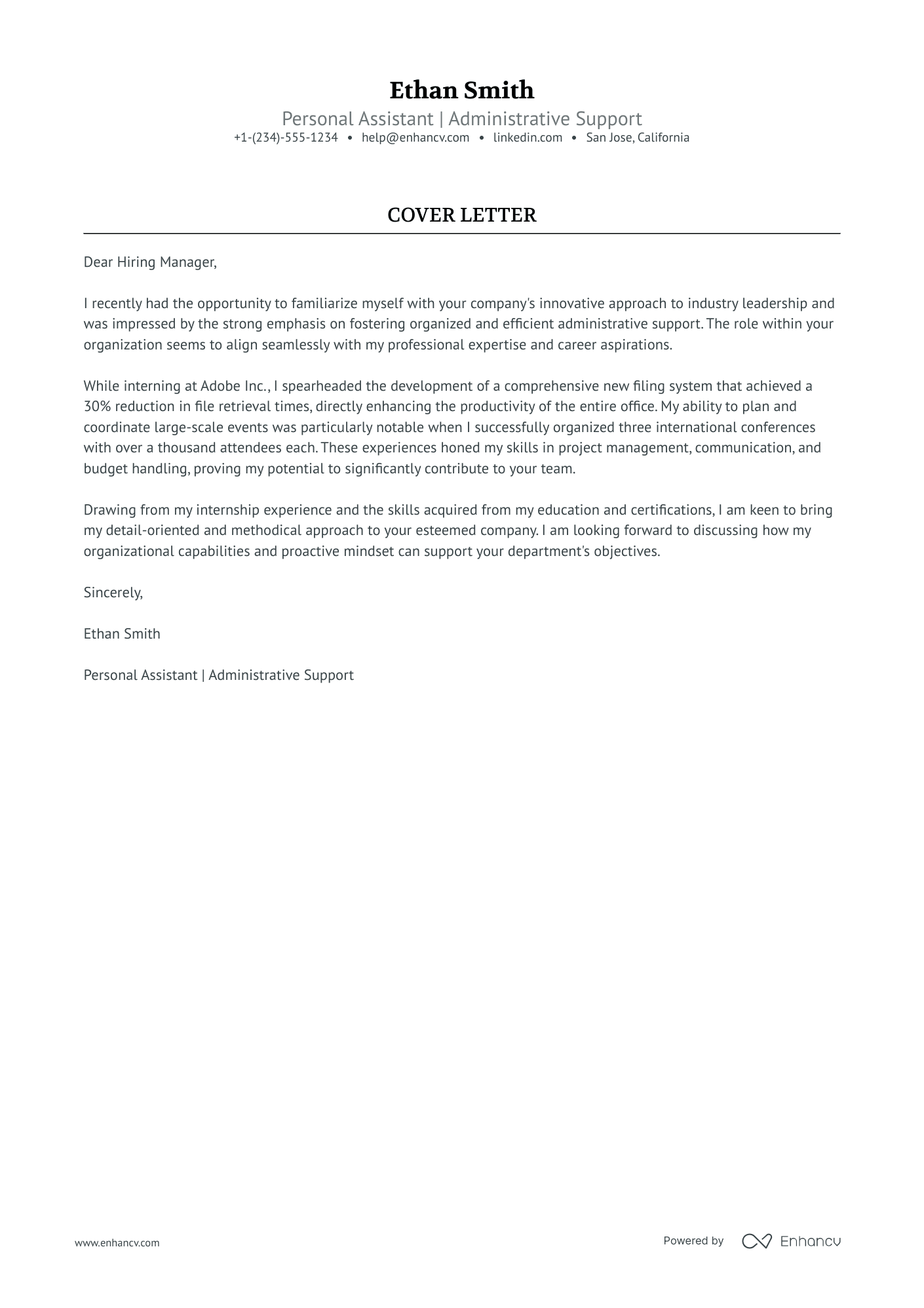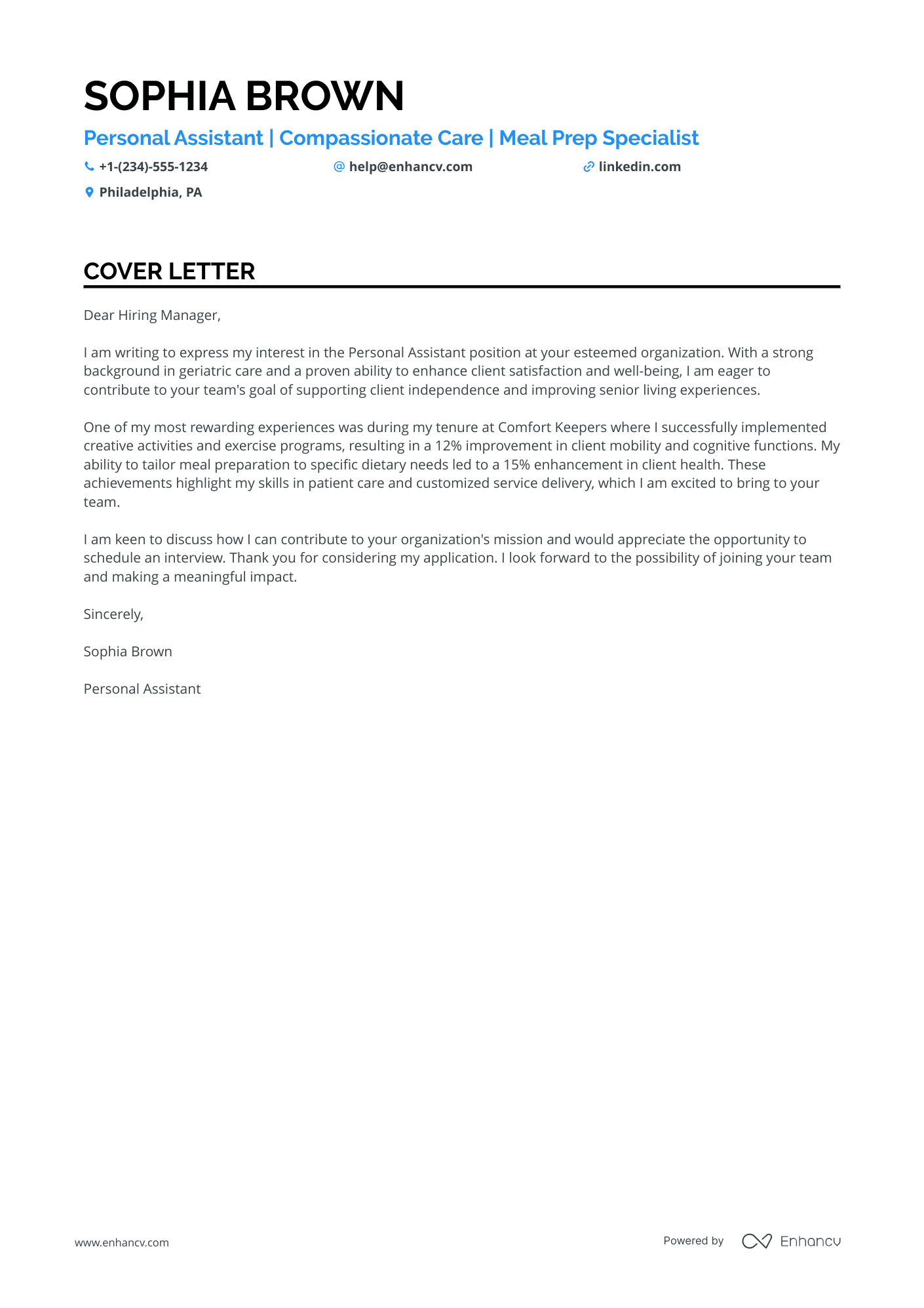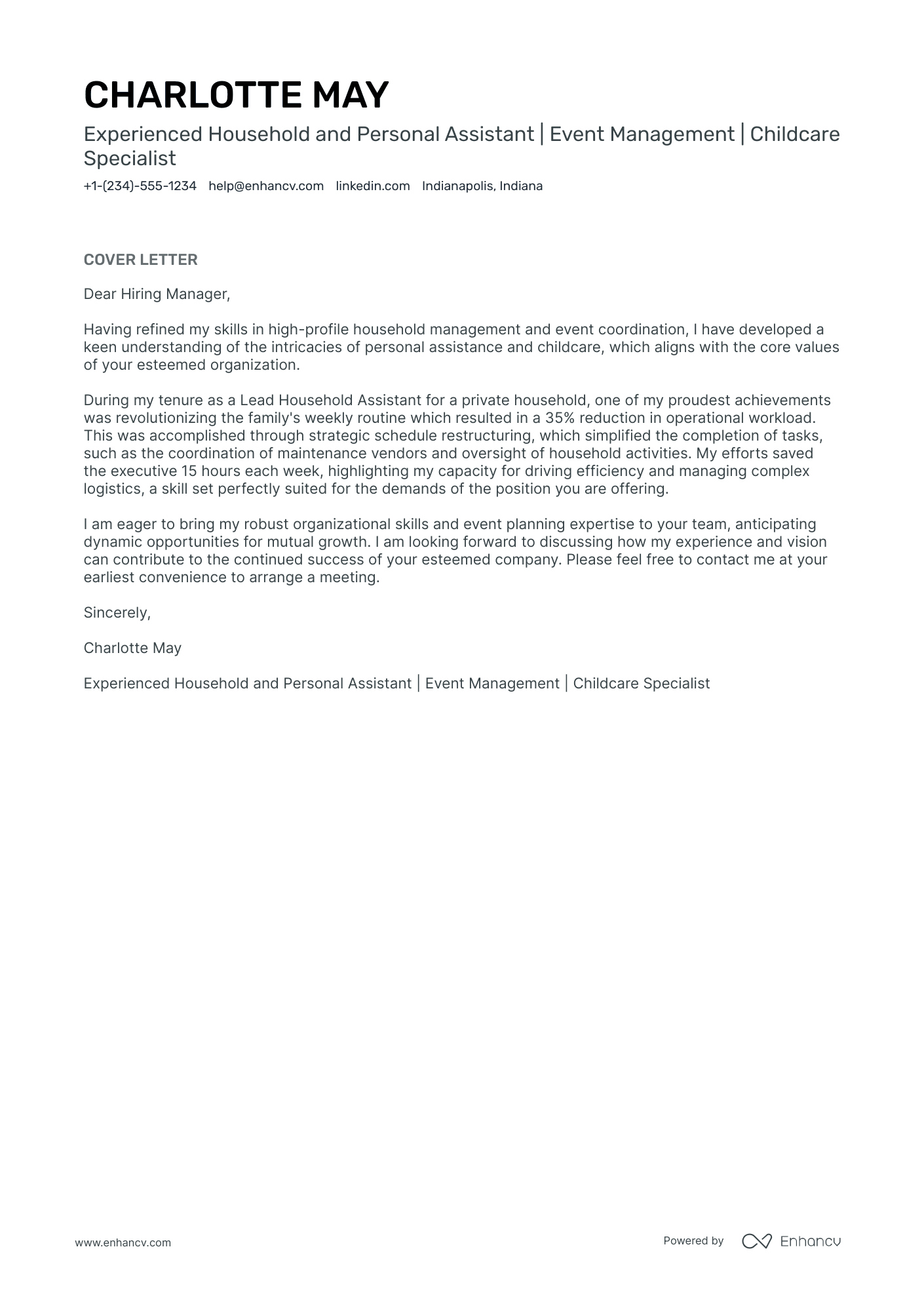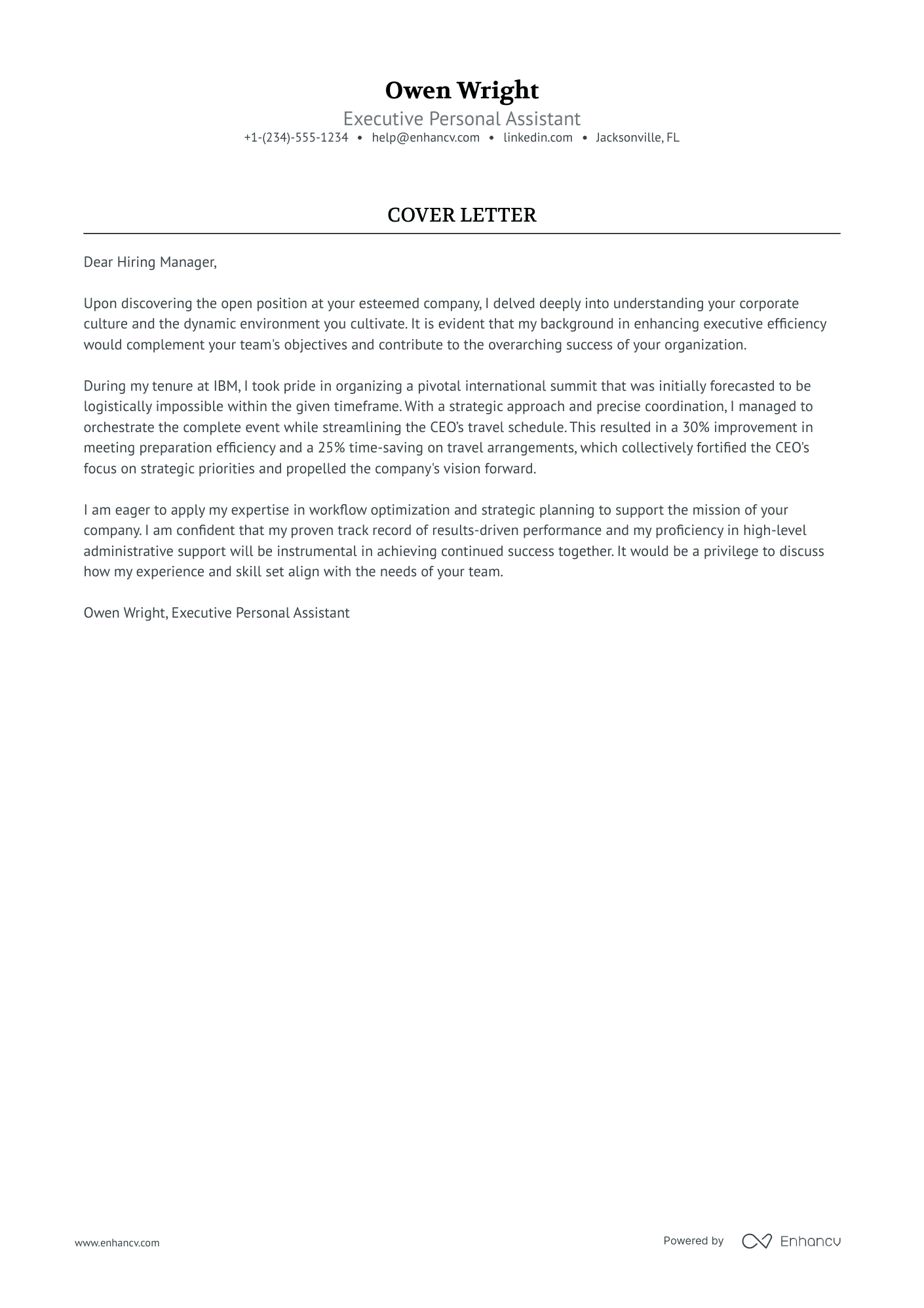As you embark on the journey to secure your dream role as a personal assistant, you've stumbled upon the challenge of crafting a compelling cover letter. Unlike your resume, which lists your qualifications, your cover letter should narrate your proudest professional achievement without falling prey to overused clichés. Striking the right balance between formality and uniqueness can be tricky, and brevity is key—your story must captivate within the confines of a single page. Let's navigate these waters together, transforming your cover letter into a standout introduction that resonates with employers.
- Write a personal assistant cover letter that helps you stand out (and get the job);
- Understand how to start and end your personal assistant cover letter with the appropriate greeting;
- What to include in the body of your personal assistant cover letter to put your best foot forward;
- Your most important achievements - how to present them as part of your personal assistant cover letter.
And if you want to make your life even easier, simply drag and drop your personal assistant resume into Enhancv's AI cover letter generator, and it will write your cover letter for you in just a few moments.
If the personal assistant isn't exactly the one you're looking for we have a plethora of cover letter examples for jobs like this one:
- Personal Assistant resume guide and example
- French Translator cover letter example
- Administrative Coordinator cover letter example
- Front Desk Manager cover letter example
- Temporary Administrative Assistant cover letter example
- Administrative Assistant cover letter example
- Translator cover letter example
Drop your resume here or choose a file.
PDF & DOCX only. Max 2MB file size.
Personal assistant cover letter example
Ava Johnson
Columbus, Ohio
+1-(234)-555-1234
help@enhancv.com
- Highlighting specific achievements, such as "redesigned the CEO's calendar system leading to a 30% decrease in scheduling conflicts," quantifies the applicant's impact and conveys their capability to deliver results.
- Aligning past experience with the job's requirements, the candidate's background in "executive support" and "event planning" directly correlates with the key responsibilities of the prospective role, making the application more relevant.
- Expressing knowledge of and alignment with the company's ethos, such as "your commitment to fostering an environment where precision and strategic planning are highly valued," demonstrates the candidate's cultural fit and understanding of the company’s values.
The must-have sections and format of your personal assistant cover letter
When writing your personal assistant cover letter, keep in mind that it'll only be read by the recruiters and not the Applicant Tracker System (or software used to assess your profile). That's why you should structure your content with a/an:
- Header (apart from your contact information, include your name, the role you're applying for, and the date);
- Personalized salutation;
- Opening paragraph to win the recruiters over;
- Middle paragraph with key details;
- Closing that starts from clichés;
- Sign off (that's not mandatory).
Industry standards dictate your paragraphs to be single-spaced and to wrap your content in a one-inch margin. Designing your personal assistant cover letter, refer to one of our templates, which automatically takes care of the spacing and margins.
Choose the same font for your personal assistant cover letter as you did for your resume: the likes of Lato and Bitter would help you to stand out in a sea of cover letters in Arial or Times New Roman.
Export your whole personal assistant cover letter from our builder in PDF to keep the same formatting and image quality.
Let us save you time! With our free cover letter generator, you can create a professional letter instantly using your resume.
The top sections on a personal assistant cover letter
- Header: This includes the applicant's contact information, the date, and the employer's details, creating a professional look and making it easy for the recruiter to identify the applicant and to know when the application was sent.
- Greeting: A personalized salutation addressing the hiring manager by name establishes a connection and shows the applicant has taken the time to research who will be reading their application, which mirrors the personalized attention expected in a personal assistant role.
- Introduction: The opening paragraph should quickly engage the employer by stating the applicant's enthusiasm for the role and why they are a perfect match, reflecting the proactive and positive attitude central to a personal assistant’s duties.
- Body: This section is critical, as it should detail the applicant's relevant experience, skills such as multitasking, communication, and organizational abilities, and specific examples of how they've successfully supported previous employers or executives, which are core responsibilities of a personal assistant.
- Closing: The closing paragraph should reiterate the applicant's interest in the position, include a call to action encouraging an interview, and thank the reader for their time, exemplifying the courteous and professional manner expected from a personal assistant.
Key qualities recruiters search for in a candidate’s cover letter
- Exceptional organizational skills: Demonstrates the ability to manage schedules, plan events, and maintain efficient office workflow.
- Strong communication abilities: Showcases proficiency in both written and verbal communication, which is essential for correspondence, coordinating with others, and representing the employer.
- Discretion and confidentiality: Highlights an understanding of the sensitive nature of the material handled by a personal assistant and a commitment to maintaining privacy.
- Time management expertise: Displays an aptitude for prioritizing tasks, managing multiple commitments simultaneously, and meeting deadlines, which helps the employer stay on track.
- Competence in multitasking: Reflects the ability to handle various tasks at once without compromising quality or efficiency, a frequent requirement in a personal assistant role.
- Adaptability and problem-solving skills: Conveys readiness to handle unforeseen challenges, adapt to changing environments, and creatively solve problems on the fly.
Personalizing your personal assistant cover letter salutation
Always aim to address the recruiter from the get-go of your personal assistant cover letter.
Use:
- the friendly tone (e.g. "Dear Paul" or "Dear Caroline") - if you've previously chatted up with them on social media and are on a first-name basis;
- the formal tone (e.g. "Dear Ms. Gibbs" or "Dear Ms. Swift") - if you haven't had any previous conversation with them and have discovered the name of the recruiter on LinkedIn or the company website;
- the polite tone (e.g. "Dear Hiring Manager" or "Dear HR Team") - at all costs aim to avoid the "To whom it may concern" or "Dear Sir/Madam", as both greetings are very old-school and vague.
List of salutations you can use
- Dear Hiring Manager,
- Dear [Employer's Name],
- Dear [Employer's Title],
- Dear Recruiting Team,
- Dear [Department] Team,
- Dear [Company Name] Representative,
The personal assistant cover letter intro: aligning your interest with the company culture
You only have one chance at making a memorable first impression on recruiters with your personal assistant cover letter.
Structure your introduction to be precise and to include no more than two sentences.
Here are some ideas on how to write a job-winning personal assistant cover letter introduction:
- get creative - show off your personality from the get-go (if this aligns with the company culture);
- focus on your motivation - be specific when you say what gets you excited about this opportunity.
The middle or body of your personal assistant cover letter body: a great instrument to tell a story
Now that you've set the right tone with the greeting and introduction of your personal assistant cover letter, it's time to get down to business.
Hear us out, the body of your personal assistant cover letter is the best storytelling instrument you have, in your job-hunting arsenal.
Writing the next three to six paragraphs, take the time to reassess the advert to discover job-crucial requirements.
Next, choose one accomplishment that covers those key skills and talents.
Use precisely that achievement to tell an exciting story of how you match the ideal candidate profile.
In the undertones of your story or personal assistant cover letter body, hint at the difference you'd make and sell your application as the perfect one for the job.
Finishing off your personal assistant cover letter with what matters most
So far, you've done a fantastic job in tailoring your personal assistant cover letter for the role and recruiter.
Your final opportunity to make a good impression is your closing paragraph.
And, no, a "Sincerely yours" just won't do, as it sounds too vague and impersonal.
End your personal assistant cover letter with the future in mind.
So, if you get this opportunity, what do you plan to achieve? Be as specific, as possible, of what value you'd bring to the organization.
You could also thank recruiters for their interest in your profile and prompt for follow-up actions (and organizing your first interview).
No experience personal assistant cover letter: making the most out of your profile
Candidates who happen to have no professional experience use their personal assistant cover letter to stand out.
Instead of focusing on a professional achievement, aim to quantify all the relevant, transferrable skills from your life experience.
Once again, the best practice to do so would be to select an accomplishment - from your whole career history.
Another option would be to plan out your career goals and objectives: how do you see yourself growing, as a professional, in the next five years, thanks to this opportunity?
Be precise and concise about your dreams, and align them with the company vision.
Key takeaways
Winning at your job application game starts with a clear and concise personal assistant cover letter that:
- Has single-spaced paragraphs, is wrapped in a one-inch margin, and uses the same font as the personal assistant resume;
- Is personalized to the recruiter (using their name in the greeting) and the role (focusing on your one key achievement that answers job requirements);
- Includes an introduction that helps you stand out and show what value you'd bring to the company;
- Substitutes your lack of experience with an outside-of-work success, that has taught you valuable skills;
- Ends with a call for follow-up or hints at how you'd improve the organization, team, or role.
Personal Assistant cover letter examples
By Experience
Entry-Level Personal Assistant
Senior Personal Assistant
- Emphasizes a strong background in geriatric care, which is critical for a Personal Assistant role that involves supporting senior independence and well-being.
- Highlights specific achievements such as implementing creative activities and exercise programs, showcasing the ability to enhance client satisfaction and health outcomes.
- Demonstrates a personalized approach to client care by tailoring meal preparation to dietary needs, leading to improved client health and underscoring customized service delivery skills.
- Expresses enthusiasm for joining the company and contributing to its mission, indicating motivation and alignment with organizational goals.
By Role













